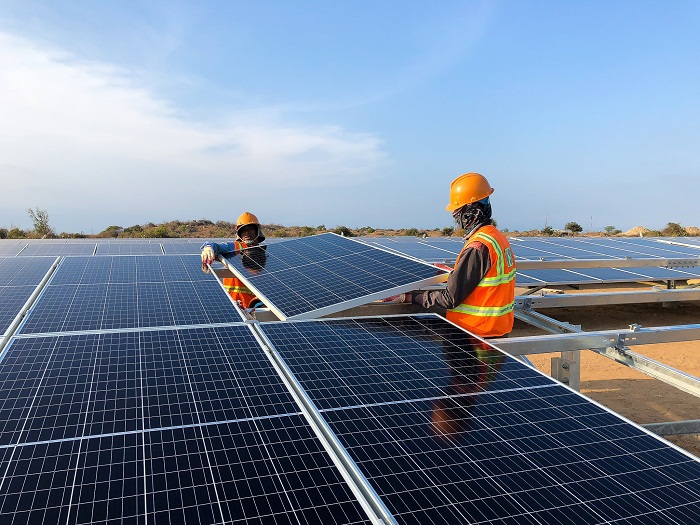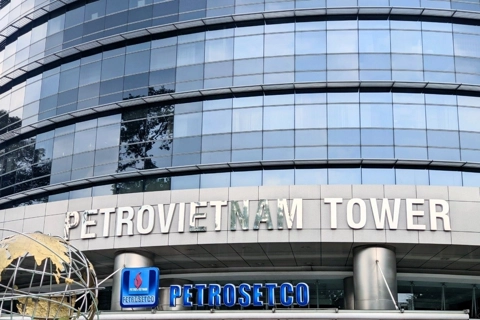EVN to have limited role in direct power purchase agreement mechanism
Government management should be separated from the generation, transmission, and distribution of electricity.
The government would set up a marketplace for direct electricity transactions between sellers and buyers, with the Vietnam Electricity (EVN) solely responsible for operating the system and ensuring the safety of the power grid.
| The Phuoc Ninh solar power project from T&T Company in Ninh Thuan Province. Photo: Hoang Anh/The Hanoi Times |
EVN’s Chairman of the Board Dang Hoang An made the comments during a meeting with Deputy Prime Minister Tran Hong Ha on May 14 to discuss the draft direct power purchase agreement (DPPA).
In the draft decree on the DPPA mechanism, the Ministry of Industry and Trade (MoIT) has developed this model through two options: using private transmission lines or the national grid (i.e., through EVN). The supply source includes renewable energy plants (wind, solar) with a capacity above 10 MW if connected to the grid, or with no capacity limit if using private transmission lines.
The draft specifies that buyers in both scenarios must be organizations or individuals using electricity for production at a voltage level of 22 kV or higher, with an average monthly consumption of 500,000 kWh. Smaller users, such as small manufacturing enterprises or households, are not yet eligible for direct purchase.
At the meeting, EVN Chairman Dang Hoang An said that direct transmission of electricity from sellers to buyers is possible, with both operating and transmission costs being paid to EVN, the grid operator.
Deputy Prime Minister Tran Hong Ha noted that the DPPA has been identified in the Electricity Law as a foundation for developing a competitive electricity market. However, progress has been slow due to inconsistent legal frameworks and specific organizational and implementation conditions. State-owned enterprises have played a dominant role in providing energy for economic and social development, making it difficult for other parties to participate in the commercialization of electricity.
"Government management should be separated from the production, business, transmission, and distribution of electricity," said Ha, adding that the State should only invest in areas that ensure national energy security, while enterprises should compete on an equal footing, regardless of whether they are state-owned or private.
He also tasked the regulatory body with developing a specific and feasible roadmap for power sector development, including the DPPA mechanism.
Foreign-invested enterprises have repeatedly requested that Vietnam pilot the DPPA mechanism soon, as they believe it will have a positive impact on competition in the energy sector. Major corporations such as Samsung, Heineken, and Nike, which have an average monthly electricity consumption exceeding 1,000,000 kWh, have shown interest in participating.
A survey by the MoITt at the end of last year indicated that about 20 large companies want to buy electricity directly, with a total demand of nearly 1,000 MW. Additionally, 24 renewable energy projects with a capacity of 1,773 MW want to sell electricity through the DPPA mechanism, and 17 projects with a capacity of 2,836 MW are considering participating in the mechanism.
At the meeting, representatives from associations and foreign businesses expressed their desire for the decree to be issued soon, with policies in line with the Power Development Plan VIII (PDP8) on renewable energy development. They suggested removing consumption limits for customers using private transmission lines and clarifying the costs of direct electricity purchases from the national grid.
In conclusion, Deputy Prime Minister Ha emphasized that there could be no capacity limit for direct power purchases using private transmission lines or additional energy storage systems, regardless of planning. These projects would only need to comply with tax, environmental, fire, and construction safety regulations.
For direct purchases through the national grid, all infrastructure operating and transmission costs must be accurately accounted for to ensure system safety and alignment with power planning, Ha noted.
He called for the DPPA decree to clearly define stakeholders, their rights, and responsibilities in terms of economic benefits and grid safety. Policies should prioritize and encourage enterprises using green, renewable energy to obtain green credits.
The MoIT and EVN are instructed to calculate and publish the capacity of renewable energy that can be purchased and transmitted according to the baseline power capacity, which will serve as the basis for adjusting the reduction of coal and gas power sources in the planning.
"The PDP VIII does not limit renewable energy if it meets the criteria for replacing other energy sources at a reasonable cost," he said. Furthermore, the decree should establish a protocol for the publication of the types of energy sources used by companies to facilitate the monitoring and granting of green credits by regulatory bodies.












